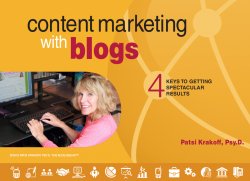 Neuromarketing is a concept based on fact plus a lot of assumptions — and it can easily evoke a little fear as well.
Neuromarketing is a concept based on fact plus a lot of assumptions — and it can easily evoke a little fear as well.
It is true that the human brain responds to images and words, which is why advertising works. It hasn’t been that long since brain science has revealed what many of us suspected: most of our decisions aren’t made in our thinking brains.
We make decisions unconsciously, using split-second intuitive processing in our emotional brains. What does this mean to marketers?
That advertising and content that appeals to our primitive emotions (sex, food, danger,pleasure) will get our attention better than long text of facts, figures, and logic.
This isn’t exactly a news flash, ask any copywriter. And yet, we don’t approach content creation that way. At least most of us don’t, because we learned in schools from teachers who didn’t understand this yet. And as educated people, we value logic and reason, facts and figures.
The assumption is that marketers, by using high-tech neurological equipment such as fMRI (functional magnetic resonance imaging) machines that trace brain activity, could create more successful ads. The fear is that use of that knowledge could do more than stoke interest in a product — it could more or less compel interest.
In an interview with the Gallup Journal, Dr. John Fleming, responded to the question if neuromarketing is something to be feared:
Fleming: I’m not sure that anyone has conclusively demonstrated that neuromarketing works, and many neuroscientists doubt it can. But that sidesteps the ethical considerations. Regardless of whether it works or not, there’s a fear that it could.
There’s a kind of Big Brother, 1984, scary aspect to it. The basic premise is that there are neurological triggers that marketers can use to further embed their brand, and the frightening dimension is that the targets don’t know they’re being targeted and manipulated.
So the idea that marketers could get access to information about what makes things happen in your brain and manipulate you without your knowledge is scary to a lot of folks. Has it been done? I don’t think it has. Could it be? It’s conceivable.
There have been a few experiments using fMRI machines to scan the brains of consumers while answering questions about products and shopping habits. So far, no big news flashes, except what copywriters already knew.
Marketers have better success when appealing to feelings and emotions first, before providing features, benefits, and logical reasons.
Perhaps the best-known neuromarketing study so far came from a researcher who was still in high school. Latney Montague was working in her father’s lab during the summer. Latney’s father happens to be Read Montague who runs the neuroimaging lab at Baylor College of Medicine in Houston. He says they decided to conduct a high-tech version of the Coke-Pepsi challenge. Read the interview here that appeared on NPR.
Here is an abridged report from Wikipedia:
In a study from the group of Read Montague, the director of the Human Neuroimaging Lab and the Center for Theoretical Neuroscience at Baylor College of Medicine, published in 2004 in Neuron[2], 67 people had their brains scanned while being given the “Pepsi Challenge“, a blind taste test of Coca-Cola and Pepsi.
Half the subjects chose Pepsi, since Pepsi tended to produce a stronger response than Coke in their brain’s ventromedial prefrontal cortex, a region thought to process feelings of reward. But when the subjects were told they were drinking Coke three-quarters said that Coke tasted better.
Their brain activity had also changed. The lateral prefrontal cortex, an area of the brain that scientists say governs high-level cognitive powers, and the hippocampus, an area related to memory, were now being used, indicating that the consumers were thinking about Coke and relating it to memories and other impressions.
The results demonstrated that Pepsi should have half the market share, but in reality consumers are buying Coke for reasons related less to their taste preferences and more to their experience with the Coke brand.














Recent Comments